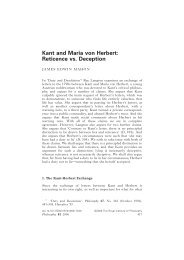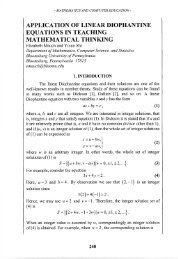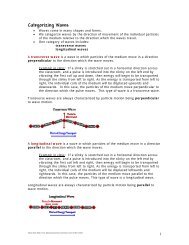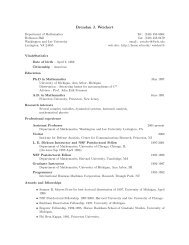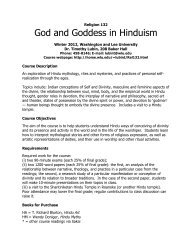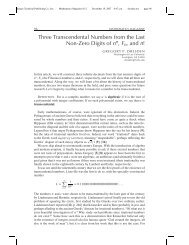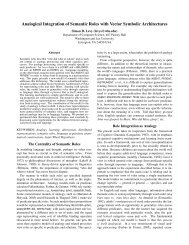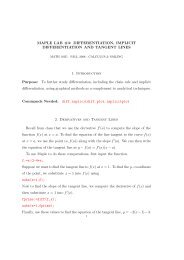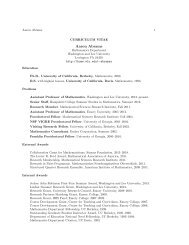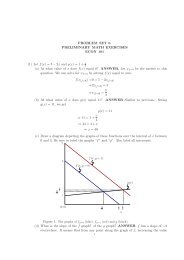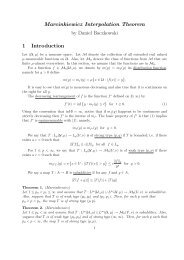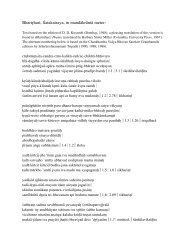comparative assessment of decentralization in africa: ethiopia desk ...
comparative assessment of decentralization in africa: ethiopia desk ...
comparative assessment of decentralization in africa: ethiopia desk ...
- No tags were found...
You also want an ePaper? Increase the reach of your titles
YUMPU automatically turns print PDFs into web optimized ePapers that Google loves.
which competitive/pluralist politics is found at local level is an <strong>in</strong>dicator <strong>of</strong> transparency andaccountability (Tegegne, Taye, Kassahun, and Meheret, 2004).In Ethiopian <strong>decentralization</strong>, we can dist<strong>in</strong>guish accountability between levels <strong>of</strong> governmentand between the government and the people. At the various levels <strong>of</strong> SNG <strong>in</strong> Ethiopia, dualaccountability exists. This takes the form <strong>of</strong> ―upward accountability‖ to higher levels <strong>of</strong>government and ―downward accountability‖ to electors. Concern<strong>in</strong>g the latter, the formalassertion <strong>of</strong> accountability is found <strong>in</strong> the Constitution, which ascerta<strong>in</strong>s that sovereignty resides<strong>in</strong> the nations, nationalities, and people <strong>of</strong> Ethiopia which is expressed through their electedrepresentatives (Article 8). Similarly, the Constitution states <strong>in</strong> Article 12 that the conduct <strong>of</strong>affairs <strong>of</strong> government shall be transparent, any public <strong>of</strong>ficial is accountable for any failure <strong>in</strong><strong>of</strong>ficial duties, and <strong>in</strong> case <strong>of</strong> loss <strong>of</strong> confidence the people may recall an elected representative(Federal Democratic Republic <strong>of</strong> Ethiopia [FDRE], 1995). The Constitution therefore providesfor the fundamental legal basis for political accountabilityAll SNG have popularly elected local councils that should be accountable to the electorate.Elections are a first important mechanism that allows people to express theirsatisfaction/dissatisfaction, <strong>of</strong> course, and secret ballot vot<strong>in</strong>g occurs once every five years. Theelectoral system provides recourse for those disenchanted with local <strong>of</strong>ficials. At the regionallevel, the councils are accountable to the people, while at the woreda level the councils areaccountable to the people by whom they are elected and to the regional executive committeethrough the zonal executive committee. Such dual accountability has its own problems <strong>in</strong> that itmight relegate accountability to electors to secondary status. In case <strong>of</strong> cities and towns with no<strong>in</strong>dependent councils, decisions affect<strong>in</strong>g cities and towns are undertaken by woreda councilors.The managers <strong>of</strong> these cities are appo<strong>in</strong>ted and accountable to woreda adm<strong>in</strong>istration (Meheret,2007). This practice br<strong>in</strong>gs upward accountability, which has a potential <strong>of</strong> neglect<strong>in</strong>gcommunity <strong>in</strong>terest.There is also a system <strong>of</strong> horizontal accountability between branches <strong>of</strong> government. Woredacouncils have stand<strong>in</strong>g committees to oversee sector activities. This practice is also evident at thefederal level, where the Prime M<strong>in</strong>ister, as chief <strong>of</strong> the executive, and various sector m<strong>in</strong>istersface the Parliament, which assesses their performance on the basis <strong>of</strong> reports. The oversightfunctions <strong>of</strong> councils, however, are compromised because <strong>of</strong> conflict <strong>of</strong> <strong>in</strong>terest, as cab<strong>in</strong>etmembers <strong>in</strong> all woredas are also members <strong>of</strong> the councils (Yilmaz and Venugopal, 2008).At the woreda level, <strong>in</strong> addition to representative accountability, there is adm<strong>in</strong>istrative/servicedelivery accountability (CIDA, 2005). This refers to woreda sector <strong>of</strong>fices (health, agriculture,education etc.) which are headed by appo<strong>in</strong>ted pr<strong>of</strong>essional civil servants. The ma<strong>in</strong> problemnoted here is the blurr<strong>in</strong>g <strong>of</strong> the dist<strong>in</strong>ction between the elected and appo<strong>in</strong>ted personnel. At theworeda level, those who run sector <strong>of</strong>fices are both elected and appo<strong>in</strong>ted <strong>of</strong>ficials.Public scrut<strong>in</strong>y rema<strong>in</strong>s one <strong>of</strong> the most important means <strong>of</strong> ensur<strong>in</strong>g accountability, but thissocial accountability is not a well-developed area <strong>in</strong> the Ethiopian <strong>decentralization</strong> schemes.Ethiopian <strong>decentralization</strong> makes no reference to civil society and there is no provision formembers <strong>of</strong> civil society to represent their constituencies <strong>in</strong> local councils or the nationalparliament (Tegegne and Kassahun, 2004). The tradition <strong>of</strong> scrut<strong>in</strong>iz<strong>in</strong>g plans, budgets, and otherdocuments is not <strong>in</strong>stituted <strong>in</strong> the <strong>decentralization</strong> drive. A recent citizen report card surveyconducted <strong>in</strong> seven regions <strong>in</strong> 21 rural woredas has shown that 87 percent <strong>of</strong> the households haveno <strong>in</strong>formation on woreda level government budget, 83 percent <strong>of</strong> the households have noETHIOPIA DESK STUDY 15



